October being one of the two transitional times in the vegetable garden in Southern California (March being the other), it is a month when I usually add compost to the beds. So compost is on my mind right now.
I’ve been using compost to fertilize my vegetable gardens for the past 15 years or so. How has it gone? What are the pros and cons?
Let’s start with the good news, the advantages, the reasons that I choose to use compost. But even before that, let me quickly define my term. Compost is any plant or animal material that has sat around for a while and decomposed substantially.
I have made and purchased compost that consists of only plant materials. You can buy this type of compost in a bag, but mostly I have purchased the yard waste compost from a municipal facility (Miramar Greenery).
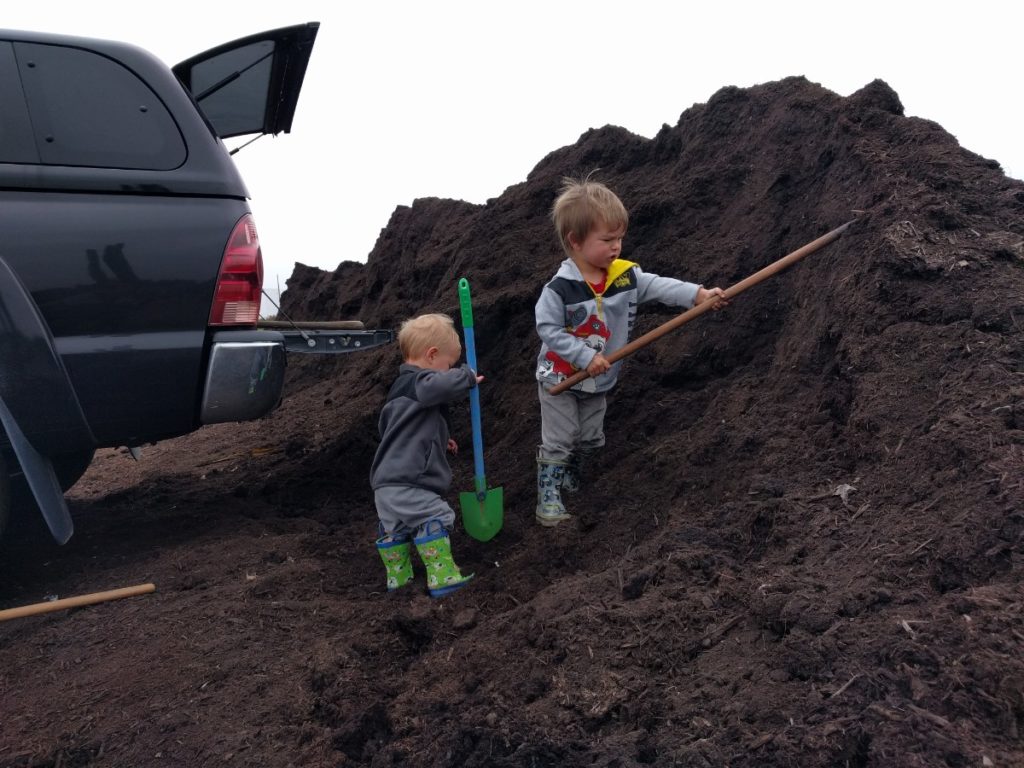
And I have made my own compost in which I added various manures (chicken, pig, horse, cow) to the plant material and let the mix break down for some months. (See the photo at the top, where my chickens are scratching through a compost pile one more time before I use it.)
Such composts can also be purchased in bags:
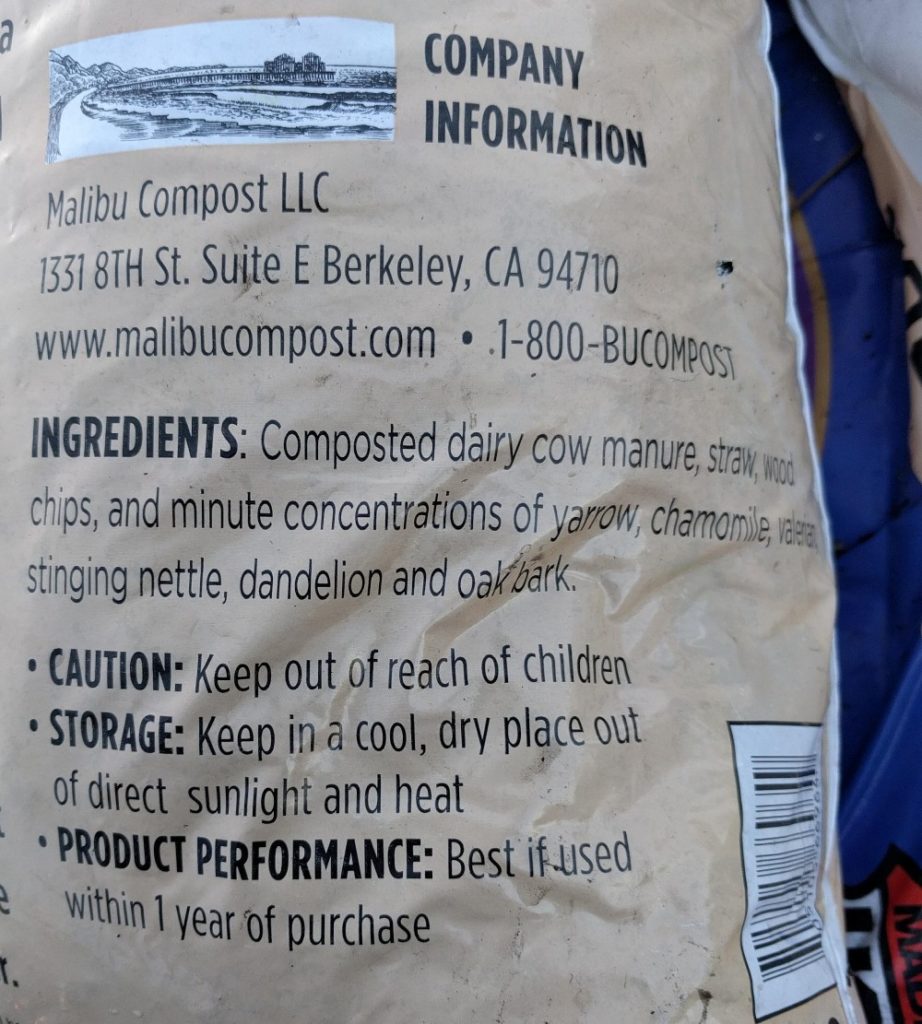
Pros: Simple
One of the advantages of compost is that it’s simple to apply. How much to add? Doesn’t much matter. If your plants aren’t growing as well as you’d like, try adding more. Can you add too much? Probably, but I’ve never seen such a case. I personally add about two inches to the surface of each vegetable bed per year.
Do you need to dig it in? No. You can, but you don’t need to. I haven’t dug compost into my vegetable beds for about eight years.
(More in my post, “Don’t dig in your garden.”)
I changed over this bed last week:
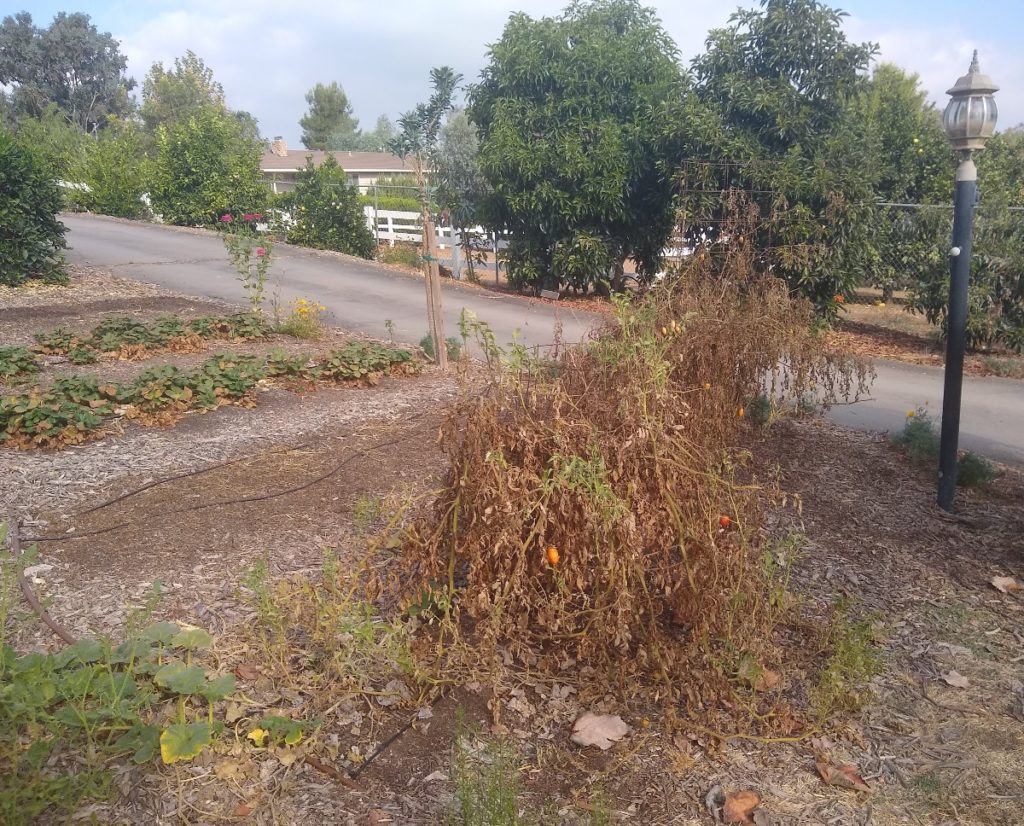
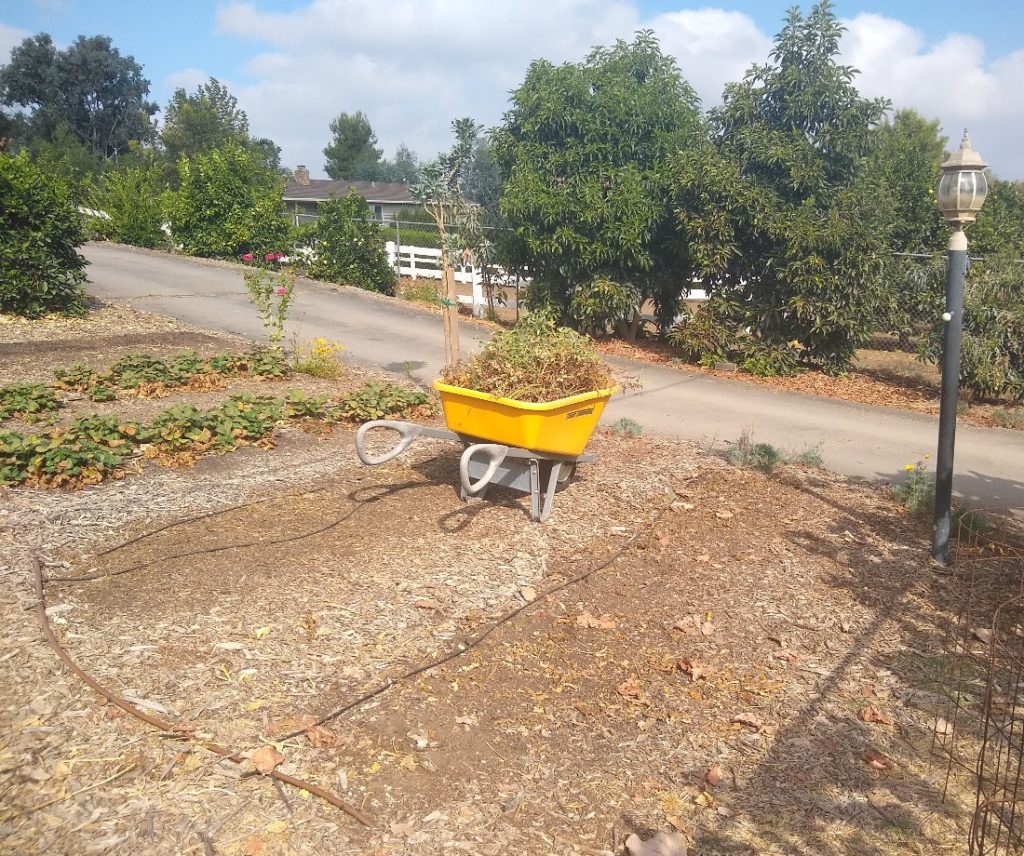
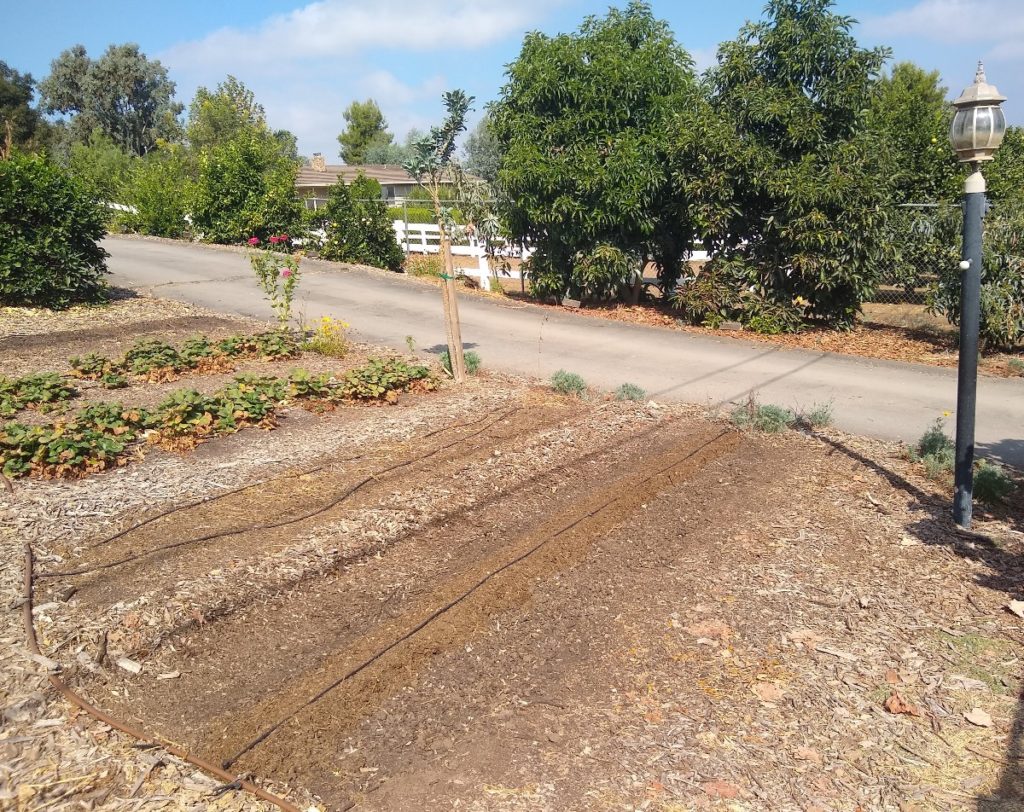
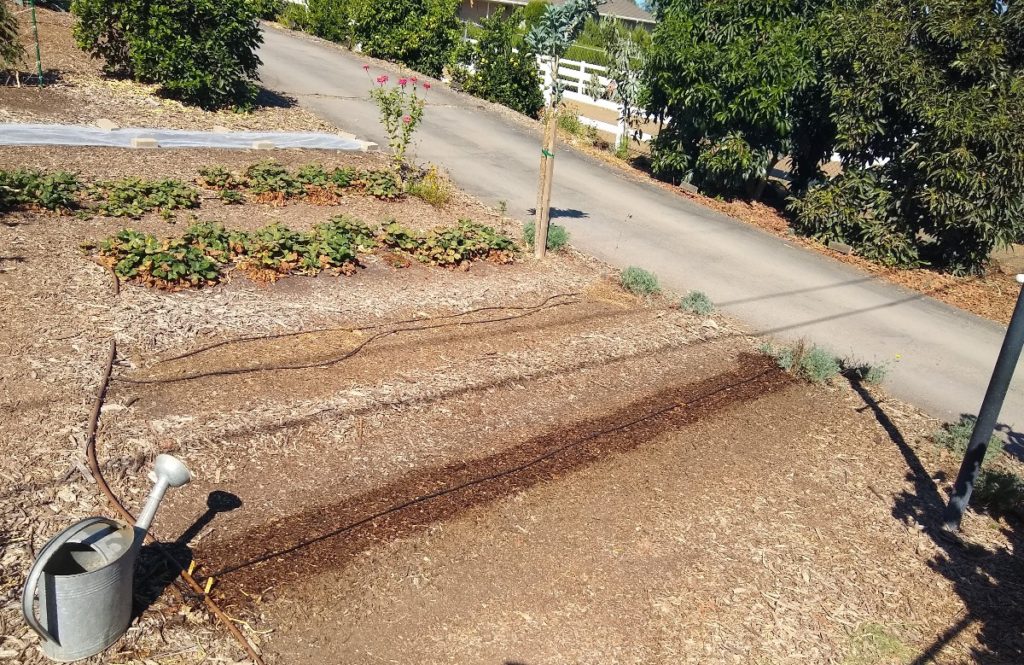
Natural
Moreover, intuitively we might sense that just spreading compost on top of a vegetable bed should work because it is similar to how nature works. In nature, a bunch of plant and animal material dies and lies on the soil surface and is taken down into the dirt by various small organisms, constantly and forever, providing nutrients for the roots of new plants.
Complete
Because compost is usually made with diverse ingredients and various parts of plants, it can contain a panoply of nutrients, all the nutrients that new plants need to grow. Therefore, compost can be your only fertilizer.
Can make own
Compost is also a convenient fertilizer in that anyone can make it on their own. It also requires very little space and effort if done in certain ways.
(See my post, “Simple composting.”)
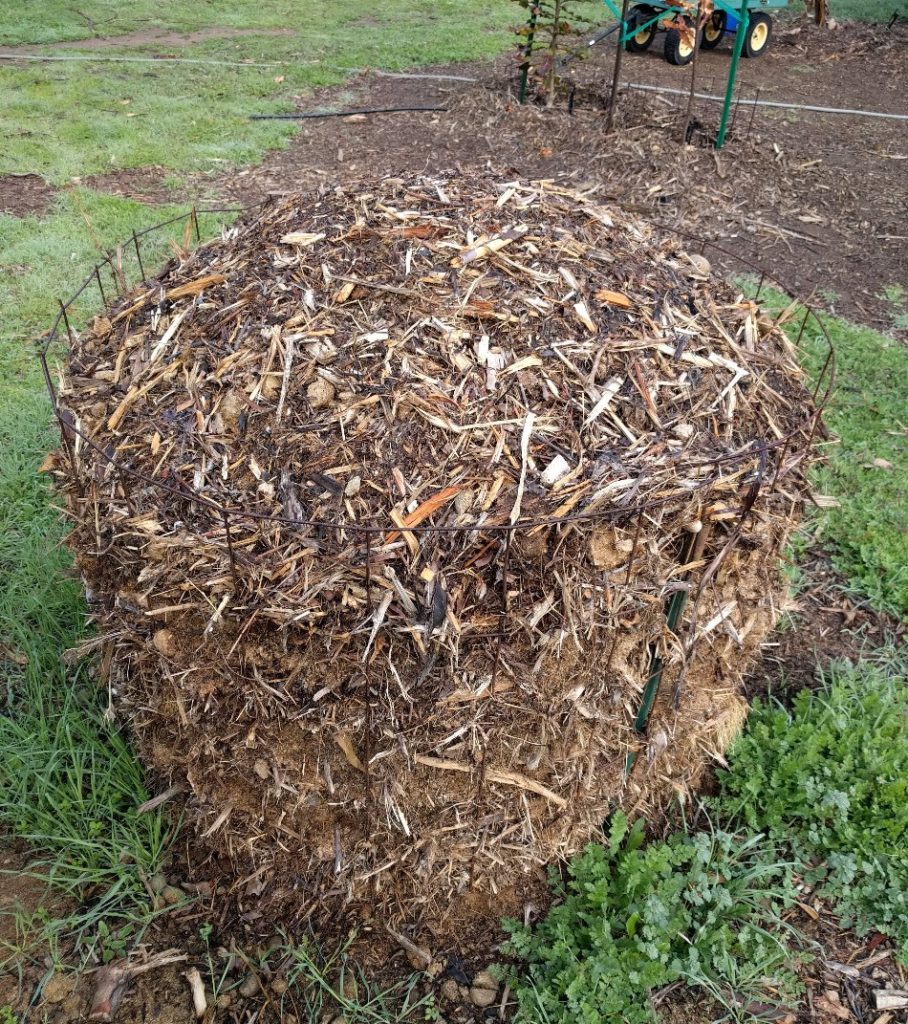
That being said, it is difficult to make as much compost as your garden needs. I’ve always had to buy or bring in extra to supplement.
Increases water and nutrient retention
Most fertilizers add nutrients but few other benefits to your vegetable garden’s soil. Compost, however, additionally “amends” the soil by improving it in various ways. In sandy soils in particular, compost improves both the water-holding and nutrient-holding capacities. The more water a soil can hold, the less often you need to irrigate. The more nutrients a soil can hold, the less often you need to fertilize.
You can read about these claims for composts everywhere, in the Western Fertilizer Handbook for example. But are these benefits so big that you’ll notice them? I sometimes think I notice such improvements in my own gardens over the years, but I can’t be sure.
(Read this thought-provoking article: “Compost may not improve orchard performance.”)
Increases permeability and aeration
Another set of benefits imparted by compost that is not strictly related to fertilization is in increasing a soil’s permeability and aeration. This means that water, air, and roots can pass through the soil more easily.
Composts that include fibrous materials such as wood and bark are especially capable of improving the soil in this way. (Page 146 in the Western Fertilizer Handbook.)
Prevents soil crusting
In my first vegetable garden, the soil had an irritating tendency to form a crust on the surface. This made it difficult to water, and it was also challenging for seeds to break through after they’d germinated. Compost, especially compost left on the surface, helps ameliorate this condition.
Weed control
Using compost as fertilizer and mulch also provides some weed control by covering the weed seeds and inhibiting their germination.
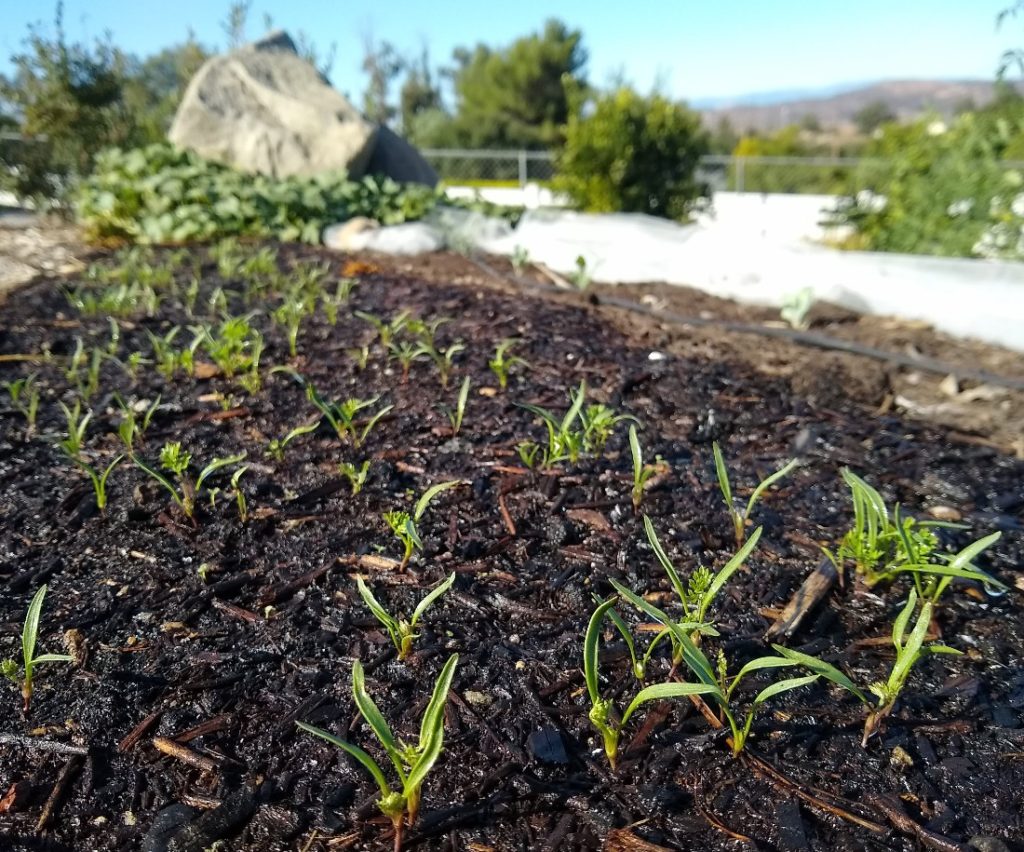
You do have to be using compost that doesn’t contain its own weed seeds. Sometimes I am too reluctant to trash plants and I end up adding some with seeds to my compost piles and, therefore, I don’t get the full weed control benefits that the compost could otherwise provide.
Keeps fruit and leaves cleaner
When it rains and there’s nothing covering the dirt of your vegetable bed, you get a lot of splashing up onto the plants. This is especially inconvenient for crops like lettuce and strawberries. Using compost on the surface of the bed as a fertilizer and mulch reduces this. It doesn’t completely prevent the splashing, in my experience, but it does significantly reduce it. So there’s less washing needed at harvest time.
Protects against soil erosion
Also when it rains, the soil on your beds can erode. I’ve always gardened on slight to extreme slopes so this has been an important consideration for me. With compost on the surface of a bed, I haven’t seen any erosion except in the heaviest of downpours.
Cons: Laborious and time consuming
Now for the other side. Fertilizing vegetables with compost does have disadvantages compared to fertilizing with other products. For one thing, compost is bulky and requires more time and effort to apply than fertilizers that you can easily sprinkle from a box, or that you can inject into your irrigation system. With compost, you must labor to make it or buy it and transport the heavy stuff to your garden and then spread it around. It is all far more time-consuming and effortful than applying other fertilizers.
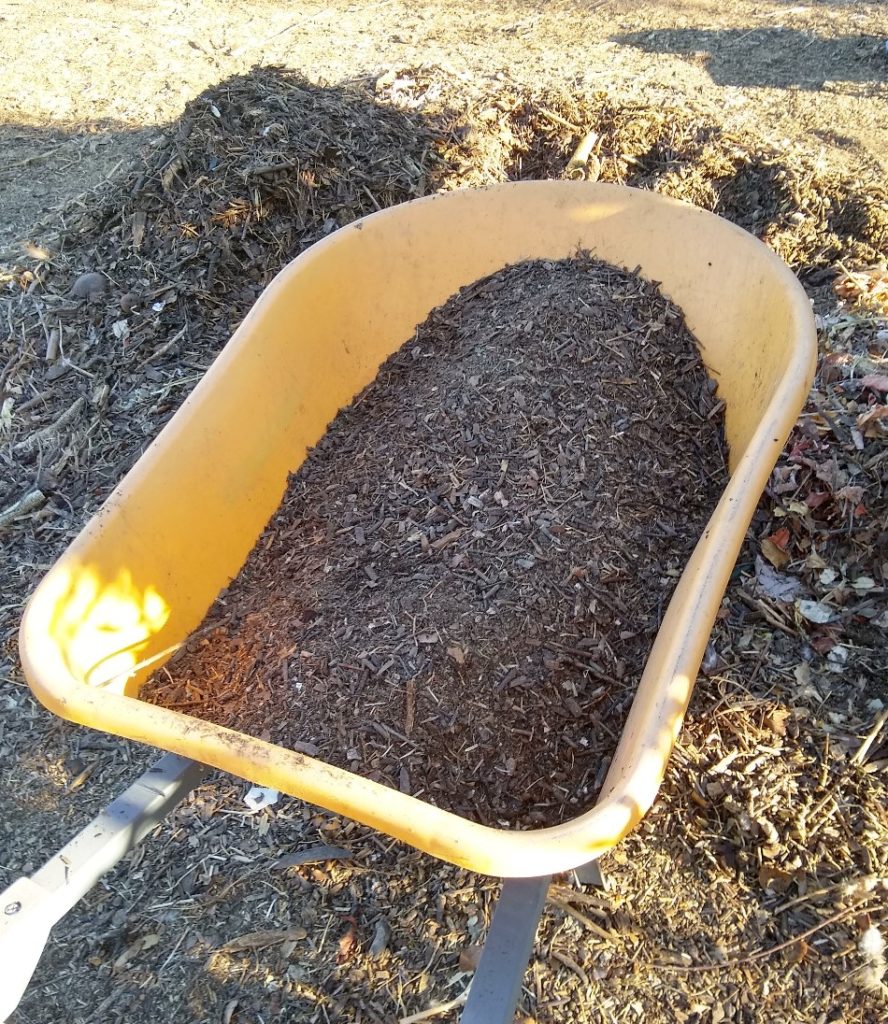
Slower acting
The nutrients in compost are mostly in a form that is slower to be used by plants versus the forms in other fertilizers. If you need instant nutrition for a plant, compost is not your best choice. Compost can take weeks to months before it is further broken down by soil microbes into the chemical forms that plant roots can use.
(See more at this University of California webpage about compost.)
Weak
Compared to other fertilizers, compost is less concentrated. While composts are variable in their characteristics and nutrient profiles according to what has been used to make them, they generally contain far less of the macronutrients that plants need to grow. Macronutrients are nutrients that plants need a lot of.
One such macronutrient is nitrogen, but compost is usually said to contain only 1.5 to 2 percent nitrogen by volume. In contrast, most organic vegetable fertilizers contain 4 percent. For example, E.B. Stone’s “Tomato and Vegetable Food” has 4 percent nitrogen, as does Down to Earth’s “Vegetable Garden” fertilizer. Therefore, pound for pound, you’re going to have to add more compost to apply the same amount of nutrients.
Why I use compost
I’ve always thought of fertilizing my vegetables with compost as doing it for the long haul. I seek a steady diet for my soil’s biology and for my plants. And I want soil with better structure and more microbes every year, such that I might even be able to take a year off and not notice a difference in plant performance.
That’s the dream, anyway. No doubt, other ways of fertilizing vegetables have advantages though. The one that appeals to me on some days is not having to load my truck or wheelbarrow and spread compost. Rather, sprinkling something from a little box sounds nice.
Yet compost comes with so many ancillary benefits — especially when used as a mulch — that I would seek to provide for my vegetables anyway. Because of this whole picture, compost remains the best method for fertilizing vegetables in my present circumstances.
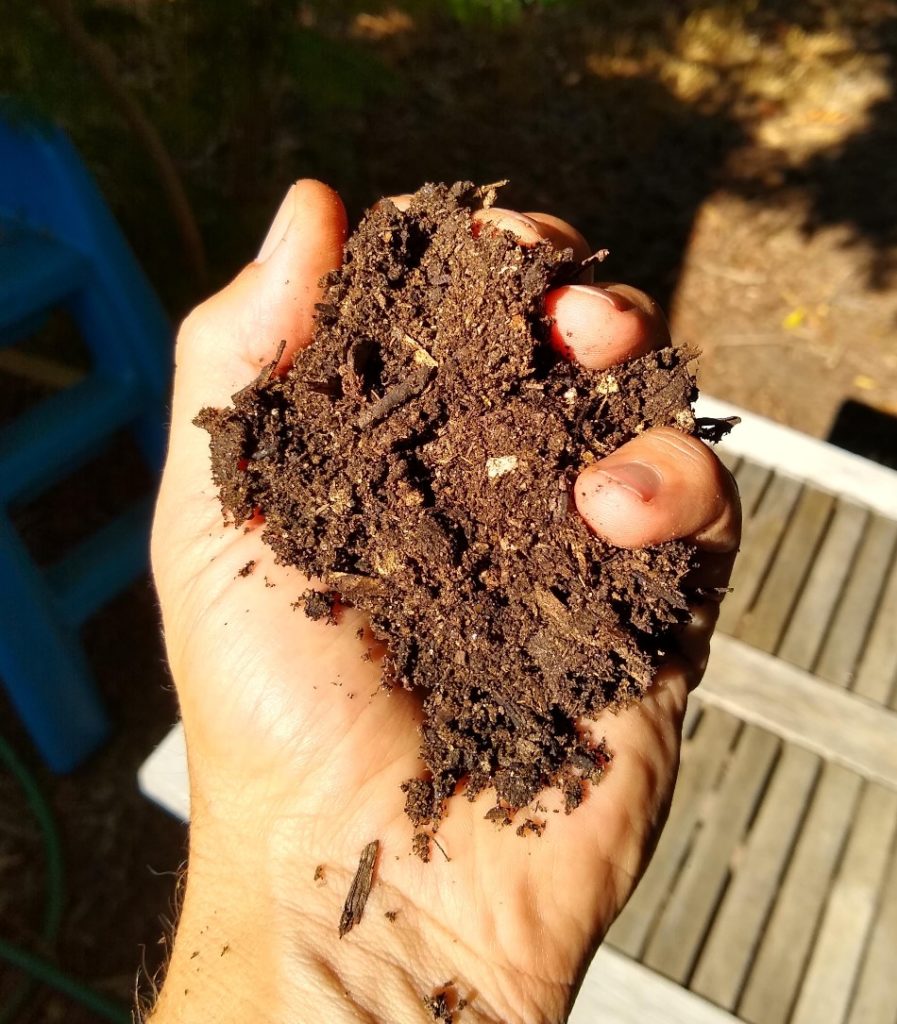
You might also like to read this related post: “Using wood chips as mulch for vegetables.”
Here is a more general fertilizing post: “Fertile soil can be child’s play.”
All of my Yard Posts are HERE

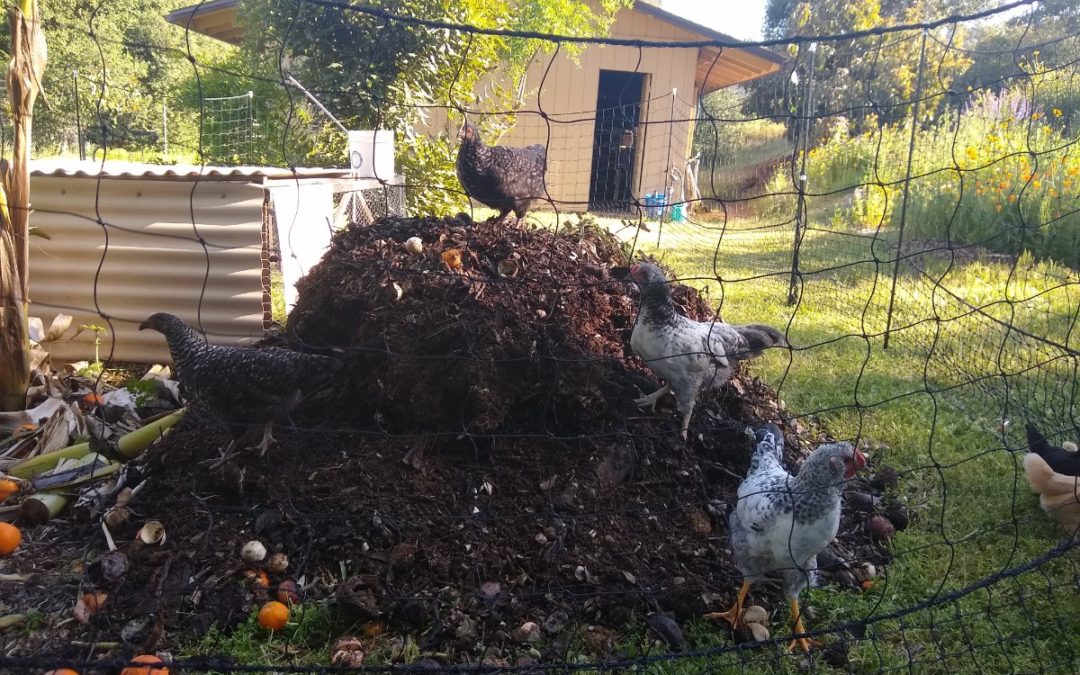


There’s also growing evidence that increases P levels is caused by use of compost over time.
https://www.growingformarket.com/articles/too-much-of-a-good-thing-compst-brings-phosphorous-challenges
Hi Eric,
Thanks for sharing that article. I had heard of phosphorous levels rising to toxicity after years of repeated manure applications but I hadn’t heard of this caused by composts. The possibility makes sense though, especially with certain composts that contain manure, such as the mushroom compost used on the farm in the article.
I’ll have to keep my eye on this. In fact, I had planned to test my soil in the next few weeks so I’ll find out what my own phosphorous levels are.
On a related note, I didn’t mention it in the post above but I do use urine as fertilizer on certain plants in my yard. I’m reminded of the post I wrote some years back about this because urine is said to have a nutrient profile that matches the needs of garden soils in Southern California well (high nitrogen, low phosphorous and potassium): https://gregalder.one/yardposts/urine-as-fertilizer/
In this post you show where you are growing directly in the ground..
How do you deal with gophers?
I got soooo many..
Hi Juan,
I trap gophers with Cinch traps. Because I have trapped diligently for the past five years or more, I haven’t lost a single vegetable in at least two or three years. Cinch traps work great for me. Here’s a post I wrote about them: https://gregalder.one/yardposts/the-best-gopher-trap-its-a-cinch/
Good morning Greg!
Thanks for the great info. I just got my first load of compost from El Corozon in Oceanside, and was also interested in checking out the Miramar facility – are they pretty similar?
Also, I have a question about applying compost to already-planted fruit trees. Can you safely apply compost right up to the tree trunk area? (My trees have about a foot of open area between the tree trunk and the bark mulch, so I was thinking of spreading compost in that area). Appreciate your advice!
Hi Brian,
I would guess that the compost from El Corazon is somewhat superior to the compost from Miramar. I’ve never used El Corazon compost, but I know farmers who do and I’ve seen it and I’ve heard Mary Matava (president of Agriservice, who oversees the operations there) speak a number of times. Based on all of that, I’d guess it is somewhat superior to the Miramar compost.
I would avoid placing the compost against the trunk because compost can retain a lot of moisture and you’re inviting crown rot issues. I often place coarse wood chip mulch right up to the trunk of fruit trees but that stuff is full of large pockets of air and I’ve never encountered a problem.
Best would be to rake back the bark mulch, spread the compost where it had been, and rake the bark mulch back over the compost. (I’m assuming you irrigate where the bark mulch is.) That arrangement works very well. On many of my trees I’ve spread compost and then wood chips on top, and after a year or two, upon scratching back the mulch, the compost has become mixed with the soil below into a layer of the darkest, most beautiful soil you can imagine.
Thanks so much Greg! Really appreciate your awesome advice!
I take old 1 gallon or 5 gallon pots, cut the bottom out, slit the side, and place them around the trunks to keep compost and mulch from damaging the trunk. It’s not so critical in the non rainy season but when it rains that moisture will rot the bark and kill the tree. I have to do this because the chickens will keep scattering the mulch and compost right onto the trunk and this keeps them from doing that.
Hi Greg. Do you know much about the Zoo poo or Zoo doo they have in Griffith Park? Its dark and rich and looks great as a compost but I worry that the poo from Zoo animals might have antibiotics or unknown drugs or something . I see people fighting over it when we go get the mulch they have for free . I mixed in the zoo poo sparingly in a few areas but I don’t trust it on my veggies or avocado or fruit trees. We have 3 compost bins but they take forever to decompose. Might not be hot enough. I just tore out all the old tomatoes and summer veggie beds and need to amend and plant for fall.
Hi Bita,
Sorry but I don’t know anything about the L.A. Zoo doo other than what I read on this page.
I wouldn’t trust it either unless I could learn more about the antibiotics and drugs issue, as you mentioned.
There always seems to be a risk when using anything not produced in your own yard. Even the compost that I use from Miramar in San Diego is made with lots of plants that have surely been sprayed by unknown chemicals by homeowners and landscapers, not to mention that there are bits of plastic and glass in there sometimes.
A couple things to try to get the home compost to decompose faster: keep moist enough (this is hard in our long, dry summers); chop pieces into small bits; turn every once in a while to get air into the middle; create a balance of dry and wet ingredients (“brown” and “green”).
If I’m running a load to the Miramar dump around this time of year I have them fill the trailer with the compost. It’s free for SD residents and costs around 20 or so if they use their front loader (which I highly recommend). Just spread it around and let the rain do the rest. It helps to have a bunch of teen age boys around to move it from the trailer to the yard.
I always chose organic especially when it comes to vegetables. But thank you for sharing this! ?
I’ve been adding lots of compost to my garden and I’m finding it’s the perfect addition to attract 1″ green florescent june bug beetles. 2″ long grubs. In an 8′ x 7′ garden area I’ve hand picked over 200 grubs four times over the course of 6 weeks. It now down to maybe 12-20 per picking.
I consulted with several nurseries, and a garden expert at The Ecology Center in San Jan Capistrano. No organic solutions from anyone. The ecology center lady recommended hand picking. This involves digging with a hand trowel about 9″ deep and while it get the job done this isn’t something you can do when garden plants are growing.
The eat the roots of growing plants as well as partially composted materials from my compost bin. After adding tons of compost my soil is black, crumbly, and envy of all my gardening friends.
I don’t want to use chemicals. I did read using cold pressed Neem oil works as a soil drench. Tried and not sure if it worked because I still get grubs. And suggestions?